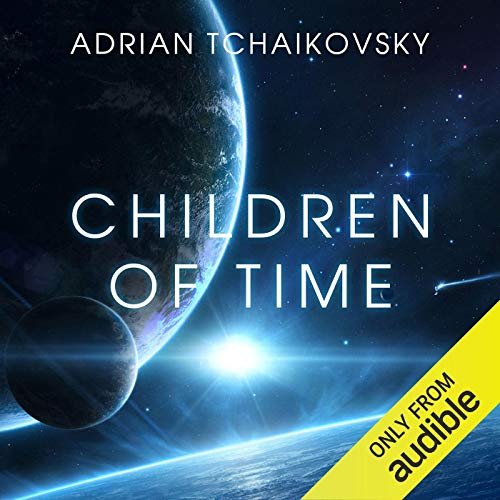“Children of Time” by Adrian Tchaikovsky
Reading Time: 6 minutes
The aim of this short article is to encourage the reading of this book and not to replace it. If you decide to purchase it through our affiliate link, we’ll get a few pence in our bank account and you’ll get a big thank you!Get the Book!
The Book Oversimplified
Children of Time is an epic sci-fi story following the very last attempt of humanity to survive our dying planet. Facing a race of intelligent spiders—mistakenly came to being because of humans’ technology—the biggest threat to men’s survival will be, unsurprisingly, themselves.
Quotes
“‘Are you proposing this as the future of the human race?’ Vitas asked flatly. ‘The future, no. A future, yes,’”
“How many inventors had been relegated to historical obscurity because some later treasure-hunter had unearthed the older, superior method of achieving the same end? Weapons, engines, political systems, philosophies, sources of energy . . . Holsten’s people had thought themselves lucky that someone had built such a convenient flight of steps back up from the dark into the sunlight of civilization. They had never quite come to the realization that those steps led only to that one place.”
“There is nothing about what we do that is natural. If we prized the natural we would still be hunting Spitters in the wilderness, or falling prey to the jaws of ants, instead of mastering our world. We have made a virtue of the unnatural.”
A Review Through Takeaways
At the peak of human civilization, men have a plan to colonize the universe. By means of an engineered virus able to accelerate evolution, they have terraformed a planet to host a population of monkeys that are supposed to be infected. Avrana Kern, the greatest mind of her generation, is about to start this experiment when one of her crew betrays them all. He’s part of a terrorist group that has taken over the Earth, and their expedition is the last one standing between the terrorist’s success and the scientist’s hopes. The struggle leads to the failure of the experiment as it was designed. Avrana Kern, sole survivor of the attack, decides to upload her consciousness to the orbiting satellite’s AI, whose main function is to transmit a message down to the planet, waiting for the monkeys to reach that evolutionary step, millennia later.
Unfortunately, none of the monkeys survives the attack. The virus, though, does, and in the absence of monkeys, it ends up infecting a race of spiders, which is propelled into intelligence.
The book spans thousands and thousands of years, and is structured so that we follow the evolution of the spiders’ civilization together with the men’s desperate journey to find a new planet in alternate chapters. Aboard the Gilgamesh, humanity’s last spaceship, after the Ancients (the generation of Avrana Kern) have poisoned the forever, a crew of engineers and a single Classicist (a man capable of understanding the Ancient’s culture) will try to land on the green planet—home of the sentient spiders—over and over again, being rejected by what remains of Avrana Kern, or simply facing internal riots, getting in and out of hibernation until no other solution is possible if not landing at all costs.
Other than being extremely exciting page after page, Children of Time is a book about empathy and understanding, highlighting how humans cannot find a point of contact between themselves even when their existence depends on it, but showing that hope is possible; even if in the form of intelligent spiders.
Build your story around a strong, central theme
Children of Time brings together aspects of storytelling usually hard to keep at a high level all at once. It’s a compelling story, with consistent characters and a gripping development, but it is also a marvellous show of originality. The spiders’ point of view and evolution is so perfectly logical and brilliantly rendered that I never doubted it could be true. The worldbuilding is functional to the story but rich enough to be believable, and yet simple enough to be understood without becoming a distraction.
And all of this is brilliantly planned around the theme of understanding.
To start, the ability of the virus to pass on information from generation to generation as if it was a physical attribute is called “Understanding” by the spiders. Plus, the spiders’ entire civilization has been shaped around the need to understand what they believe to be God, i.e. the signal coming from Avrana Kern’s satellite, aimed at humans, and hence, difficult to translate to arthropods’ language.
But the difficulties in understanding each other arise especially from the Gilgamesh crew. The weight of their responsibility, representing the last hope for humanity to survive, will divide them into two factions that won’t be able to come to an agreement. Should they attack Avrana Kern and conquer the green planet, or go back to hibernation for a few centuries in search of another place to live?
The Ancients, as brilliant as they were, went extinct because of their lack of empathy and their inability to understand each other. So, what can the last humans learn from their mistakes?
Conclusion
A novel of this type, so consistent with the central theme and yet so thrilling in every passage, results to be incredibly satisfying.
Whether you re-write your first draft into the theme or you begin with it in mind, I believe any reader will appreciate your effort to tie all the knots together in a beautiful symphony of theme, plot, story and voice.
Alla prossima.
Get the Book from Amazon/Audible (UK)


